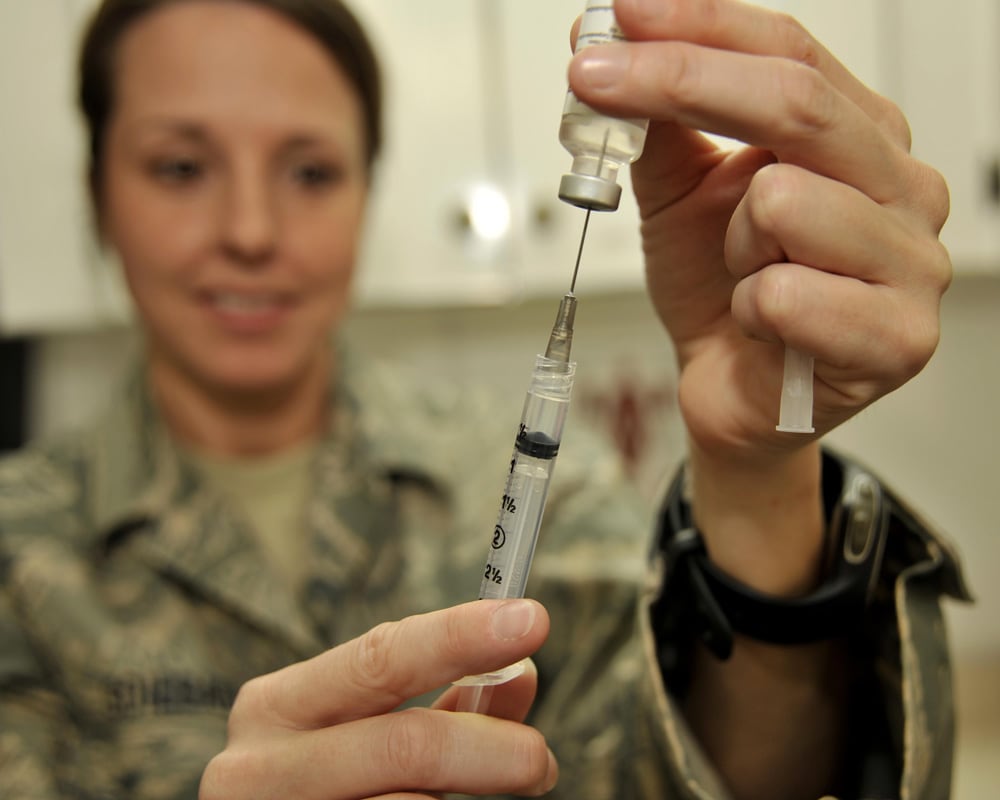Despite a recurrence of measles affecting states across the nation, strict immunization policies that require service members to be vaccinated against infectious diseases and programs that encourage family members to get their shots have kept the U.S. military nearly measles-free since 2008.
According to Defense Department data, just three cases of measles have occurred since 2008 in a beneficiary population of 9.5 million.
The most recent was a Tricare patient in Southern California diagnosed in November — a month before the start of the Disneyland outbreak that was the wellspring of the current wave of cases.
The other two cases were an active-duty airman who contracted the highly infectious disease in April 2014 and an active-duty sailor who did the same in 2008.
As once-suppressed diseases like measles, mumps and whooping cough make a comeback in the U.S., troops, retirees and families served by DoD health care have remained epidemic-free mainly because of the service's strict immunization guidelines.
They stipulate that all active-duty troops and recruits receive all immunizations — with the exception of the human papilloma virus vaccine — recommended by the Health and Human Services Department's Advisory Committee on Immunization Practices, or ACIP.
According to military policy, new accessions must present either proof of immunity or demonstrate immunity — verified by a blood tests — to attend basic training or they are required to receive all immunizations recommended for their age group.
Exemptions are allowed for medical reasons or religious considerations, but policies vary by service.
For medical exemptions, troops must have a legitimate reason verified by a medical doctor.
For religious exemptions, the Army provides accommodations but requires soldiers to go before a board that includes commanders, medical personnel and chaplains to explain their request.
The Navy and Marine Corps grants waivers on a case-by-case basis; while the Air Force does not allow permanent exemptions for religious reasons; instead, the service member's parent command has the authority to approve and revoke temporary immunization waivers.
DoD encourages dependents to receive all immunizations as recommended by ACIP but the department cannot require family members to get vaccines. Still, military dependents who attend on-base child development centers or schools must comply with the policies of their respective facilities, although they follow ACIP recommendations for childhood immunizations.

Tetanus, hepatitis A and B, influenza, small pox, anthrax and typhoid are just a few examples of immunizations required for military members. These immunizations are a critical part of maintaining force readiness.
Photo Credit: Master Sgt. Brian Davidson/Air Force
Department of Defense Education Activity officials said they also monitor students to ensure that they are following the recommended immunization schedule.
Still, the system and many child care centers allow exemptions for medical or religious reasons.
For a religious exemption, parents simply need to furnish a written statement from a parent saying he or she objects to the immunization based on personal beliefs.
Even with the leeway provided by the religious waiver request, few children in the DoDEA school system lack the ACIP recommended vaccinations.
DoDEA spokesman Frank O'Gara said 428 students in the system — less than 1 percent of the student population — have immunization exemptions, and there have been no confirmed cases of measles in DoD schools.
As of Feb. 13, the Centers for Disease Control said that 141 people had contracted measles from Jan. 1 through Feb. 13, with 113 of those cases linked to the outbreak at Disneyland.
Since 2001, there have been nearly 2,000 cases of measles in the U.S., with nearly a third occurring in 2014. That year, measles infected 383 unvaccinated members of the Amish community in Ohio who were thought to be infected when one or more of their members traveled to do volunteer work in the Philippines.
Measles causes a rash, runny nose and high fever, and in some cases, severe complications like pneumonia and encephalitis.
The highly infectious disease spreads through mucus and air droplets and can live for up to two hours on a surface or in an airspace where an infected person has coughed or sneezed, according to the CDC.
Measles is so contagious that 90 percent of people who are not immune will contract it if they come into contact with a person who is infected.
Staff writer Karen Jowers contributed to this report.
Patricia Kime is a senior writer covering military and veterans health care, medicine and personnel issues.





